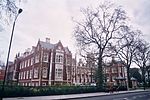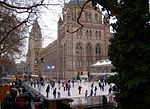James Edmeston
1791 births1867 deaths19th-century English architects19th-century English musiciansArchitects from London ... and 5 more
Christian hymnwritersEnglish AnglicansEnglish hymnwritersPeople from WappingPeople from the London Borough of Hackney

James Edmeston (10 September 1791 – 7 January 1867) was an English architect and surveyor; he was also known as a prolific writer of church hymns. He was born in Wapping, Middlesex, England. His maternal grandfather was the Reverend Samuel Brewer, congregationalist pastor at Stepney Meeting House for 50 years. However, James was attracted to the Church of England and soon became an Anglican.
Excerpt from the Wikipedia article James Edmeston (License: CC BY-SA 3.0, Authors, Images).James Edmeston
Onslow Square, London Brompton (Royal Borough of Kensington and Chelsea)
Geographical coordinates (GPS) Address Nearby Places Show on map
Geographical coordinates (GPS)
| Latitude | Longitude |
|---|---|
| N 51.4916 ° | E -0.1746 ° |
Address
St Paul, Onslow Square
Onslow Square
SW7 3NX London, Brompton (Royal Borough of Kensington and Chelsea)
England, United Kingdom
Open on Google Maps










